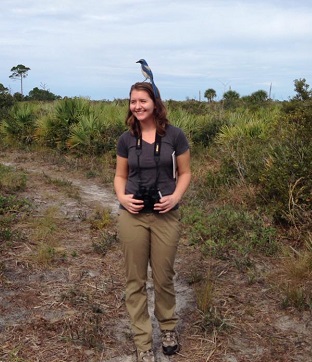University of Oxford
11a Mansfield Rd
OX1 3SZ
UK

Molly Grace
Background
Previously, Molly's research focus was in road ecology, specifically the effects of roads on behaviour of wildlife and humans. She pursued this interest at Duke University (working with Steve Nowicki and Rindy Anderson studying how traffic noise affects songbird communication) and at the University of Central Florida (working with Reed Noss to explore how traffic noise affects amphibian behaviour, and how best to prevent collisions between vehicles and large animals).
Research Interests
Conservation ecology, species recovery, road ecology, urban ecology, knowledge exchange.
Current Research

Molly is the Task Force Coordinator for the IUCN Green List of Species initiative.
The Green List will be a standardised way to measure species recovery and the role that conservation actions play.
Published Papers
Grace, M, HR Akçakaya, E Bennett, C Hilton-Taylor, B Long, EJ Milner-Gulland, R Young, M Hoffmann. In press. Using historical and paleoecological data to inform ambitious species recovery targets. Philosophical Transactions of the Royal Society B: Biological Sciences. DOI: 10.1098/rstb.2019.0297.
PJ Stephenson, M Grace, HR Akçakaya, ASL Rodrigues, B Long, DP Mallon, E Meijaard, JP Rodriguez, RP Young, TM Brooks, C Hilton-Taylor. In press. Defining the indigenous ranges of species to account for geographic and taxonomic variation in the history of human impacts: reply to Sanderson 2019. Conservation Biology. DOI: 10.1111/cobi.13400.
Garnett, S, S Butchart, B Baker, E Bayraktarov, K Buchanan, A Burbidge, A Chauvenet, L Christidis, G Ehmke, M Grace, D Hoccom, S Legge, I Leiper, D Lindenmayer, R Loyn, M Maron, P McDonald, P Menkhorst, H Possingham, J Radford, A Reside, D Watson, J Watson, B Wintle, J Woinarski, H Geyle. 2018. Metrics of progress in the understanding and management of threats and their application to Australian birds. Conservation Biology. doi: 10.1111/cobi.13220
Akcakaya, R, E Bennett, T Brooks, M Grace, A Heath, S Hedges, C Hilton-Taylor, M Hoffmann, D Keith, B Long, DP Mallon, EJ Milner-Gulland, ASL Rodrigues, JP Rodriguez, PJ Stephenson, S Stuart, R Young. 2018. Quantifying Species Recovery and Conservation Success: a practical framework for expanding the IUCN Red List of Threatened Species. Conservation Biology, doi: 10.1111/cobi.13112. Open Access.
Grace, M, RF Noss. 2018. Evidence for selective avoidance of traffic noise by anuran amphibians. Animal Conservation, 21(2018): 343–351. doi: 10.1111/acv.12400.
Grace, M, et al. 2017. Reducing the threat of wildlife-vehicle collisions during peak tourism periods using a Roadside Animal Detection System. Accident Analysis & Prevention, 109: 55-61.
Grace, M, et al. 2017. Roadside Abundance of Anurans within a Community Correlates with Reproductive Life History. Frontiers in Ecology and Evolution 5: 65. doi:10.3389/fevo.2017.00065. Open Access.
Grace, M, et al. 2015. Testing alternative designs for a roadside animal detection system using a driving simulator. Nature Conservation 11: 61–77. doi:10.3897/natureconservation.11.4420. Open Access.
Grace, M, RC Anderson. 2014. No frequency shift in the “D” notes of Carolina chickadee calls in response to traffic noise. Behavioral Ecology & Sociobiology, 69(2): 253-263.
MANUSCRIPTS IN REVIEW
Akçakaya, HR, A Rodrigues, D Keith, EJ Milner-Gulland, EW Sanderson, S Hedges, D Mallon, M Grace, B Long, E Meijaard, PJ Stephenson. In review. Assessing Ecological Function in the Context of Species Recovery.
Veríssimo D, T Pienkowski, M Arias, L Cugnière, H Doughty, M Hazenbosch , E de Lange, A Moskeland, M Grace. In review. Ethical publishing in biodiversity conservation science.
Castaneda, E, V Leavings, RF Noss, Grace M. In review. Are roadside ditches an ecological trap? The effects of traffic noise on tadpole behavior and development.
REPORTS
Smith, DJ, MK Grace, A Miller. 2015. Assessing the Effectiveness and Reliability of the Roadside Animal Detection System on US Highway 41 near the Turner River in Collier County. Final Report. Contract No. BDV37, TWO #2. Florida Department of Transportation, District One, Bartow, FL. 70 pp. + appendices.
Smith, DJ, MK Grace, HR Chasez, MJW Noss. 2015. State Road 40 Pre-Construction Wildlife Movement Monitoring: Areas A, B and F. Final Report, Contract No. BDK78, TWO #501- 3. Florida Department of Transportation, District Five, Deland, FL. 90 pp. + appendices.
Presentations and Posters
*bold text= award-winning presentation
INVITED PRESENTATIONS
M.Grace, MK. April 2019. Quantifying Conservation Success: The IUCN Green List of Species. International Otter Congress 2019, Tangjiahe National Preserve, China.
Grace, MK. February 2019. Avoiding extinction isn’t enough: developing a system to incentivise species recovery. The Oxford University Biological Society seminar series.
Grace, MK. January 2019. Using knowledge of the past to set conservation goals in the present. The past is a foreign country: how much can the fossil record really inform conservation? The Royal Society, London.
Grace, MK. October 2018. What does conservation success look like? Proposing a recovery framework with the IUCN Green List of Species. Seminar Series at the Center for Macroecology, Evolution, and Climate, University of Copenhagen.
Grace, MK. April 2018. Quantifying Species Conservation Success: The IUCN Green List of Species. Meeting of the IUCN SSC Red List Technical Working Group, University of Cambridge.
Grace, MK. March 2018. Conservation goals informed by ecology: Operationalising the IUCN Green List of Species. Showcasing Zoology Knowledge Exchange: lunchtime seminar and Q&A session. Department of Zoology, University of Oxford.
Grace, MK. November 2017. The IUCN Green List of Species: An Optimistic New Vision for Conservation. Presentation to Centre for Ecology and Hydrology, Wallingford, UK.
TALKS
1. Grace, MK, DJ Smith, RF Noss. May 2017. Promise and Limitations of Roadside Animal Detection Systems. International Conference on Ecology and Transportation, Salt Lake City, UT.
2. Grace, MK, DJ Smith, RF Noss. September 2016. Acclimation of drivers to a Roadside Animal Detection System. Infra Eco Network Europe, University of Lyon, Lyon, France.
3. Grace, MK and RF Noss. August 2016. Do anuran amphibians avoid traffic noise? An experimental field study. Ecological Society of America, Ft. Lauderdale, FL.
4. Grace, MK, DJ Smith, RF Noss. July 2016. Patterns of Anuran Abundance near Roads are Explained by Life History Traits. Joint Meeting of Ichthyologists and Herpetologists, New Orleans, LA.
5. Grace, MK and RF Noss. March 2016. Assessing the Impact of Traffic Noise on Amphibian Populations. Southeastern Ecology and Evolution Conference, University of Florida, Tallahassee, FL.
6. Grace, MK and RF Noss. February 2016. How does traffic noise affect anuran populations? A “phantom road” approach. Southeast Partners in Amphibian and Reptile Conservation, Nauvoo, AL.
7. Grace, MK and RF Noss. September 2015. Anurans as a model for investigating mechanisms by which traffic noise could reduce abundance of animal populations. International Conference on Ecology and Transportation, Raleigh, NC.
8. Grace, MK, DJ Smith, RF Noss. September 2014. Good enough, or room for improvement? Testing alternative designs for a roadside animal detection system using a driving simulator. Infra Eco Network Europe, Malmö University, Malmö, Sweden.
9. Grace, MK. March 2014. Using a driving simulator to test the effectiveness of an animal detection system in reducing wildlife-vehicle collisions. Southeastern Ecology and Evolution Conference, Georgia State University.
10. Grace, MK and RC Anderson. March 2013. Acoustically complex notes: a strategy for effective songbird communication in a noisy world? Southeastern Ecology and Evolution Conference, University of Central Florida.
11. Grace, MK. February 2013. Assessing the effectiveness of a roadside animal detection system using a driving simulator. CATSS-UTC Symposium on Transportation Issues and Simulation, University of Central Florida.
12. Grace, MK, C Montgomery, and R Reddy. November 2010. The influence of termitaria on woody plant communities in Kruger National Park, South Africa. Presentation to South African National Parks staff, Kruger National Park, South Africa.
Posters
Grace, MK, R Akçakaya, E Bennett, T Brooks, A Heath, S Hedges, C Hilton-Taylor, M Hoffmann, D Keith, B Long, D Mallon, E Meijaard, E.J. Milner-Gulland, A Rodrigues, JP Rodriguez, P Stephenson, S Stuart, R Young. March 2018. A Framework for Evaluating Conservation Success: the IUCN Green List of Species. Safeguarding Space for Nature Symposium, Zoological Society of London.
Grace, MK, E Castaneda, V Leavings, R Noss. Traffic noise alters tadpole behavior, but does not affect growth. International Conference on Ecology and Transportation, Salt Lake City, UT.
Smith, N, MK Grace, K Arnaldi, C Bunner, K Guilfoyle, K Klein, K Mercier, J Napier, D Perry, K Phillips, R Rautsaw, G Stahelin, D Volk, and DG Jenkins. Toward a macroecology of roadkill. International Biogeography Society, Tucson, AZ.
Grace, MK, DJ Smith and RF Noss. October 2015. Roadside Animal Detection Systems: Lessons from the field and lab. Graduate Fellows Symposium, University of Central Florida.
Grace, MK and RF Noss. July 2015. How does traffic noise influence wildlife abundance? An investigation using anurans as a model. Joint Meeting of Ichthyologists and Herpetologists, Reno, NV.
Grace, MK and RF Noss. March 2015. Deterrent, disruptive, or deadly – what effect does traffic noise have on wildlife populations? Southeastern Ecology and Evolution Conference, University of Georgia, Athens, GA.
Grace, MK, DJ Smith and RF Noss. April 2014. Animal detection system on U.S. Highway 41 (Collier Co., FL) is effective at reducing wildlife-vehicle collisions in a simulated environment. Graduate Research Forum, University of Central Florida, Orlando, FL.
Grace, MK, DJ Smith and RF Noss. June 2013. Use of a driving simulator to evaluate the effectiveness of a Roadside Animal Detection System on U.S. Highway 41, Collier County, Florida. International Conference on Ecology and Transportation, Scottsdale, AZ.
Grace, MK and RC Anderson. March 2013. Songbirds’ acoustically complex notes may facilitate communication in noisy urban areas. Annual Meeting of the Association of Field Ornithologists, Archbold Biological Station, Venus, FL.
Grace, MK and RC Anderson. April 2012. Make them hear you: acoustically complex notes may help songbirds communicate in traffic noise. Duke University Visible Thinking symposium, Duke University.
Grace, MK. August 2009. Swamp sparrow (Melospiza georgiana) females may use song as an indicator of age in a potential mate. HHMI Undergraduate Research Fellowship Symposium, Duke University.
Supervision & Funding
2018
National Environmental Research Council Knowledge Exchange Fellowship. PI: Molly Grace “Assessing conservation success in government, policy, and business using the IUCN Green List of Species”. £149,577; 1 Aug. 2018 – 31 July 2021.
2018
University of Oxford Knowledge Exchange Seed Fund. PI: Molly Grace. “Making the IUCN Green List work for government and business”. £3,222; 1 April 2018 – 31 June 2018
2017
National Environmental Research Council Knowledge Exchange Fellowship. PI: Molly Grace “From Red to Green: Synthesizing research to create a metric of species conservation success for multiple end-users”. £34,412; 11 Sept. 2017 – 10 April 2018.
